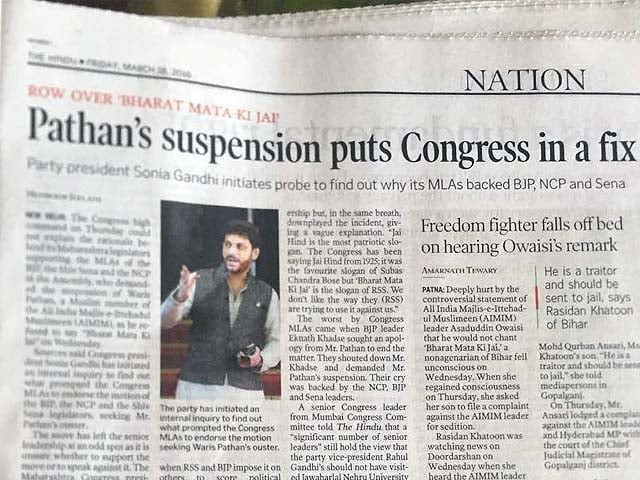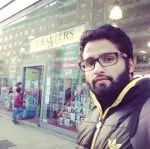In the double irony – which seems to have become a hallmark now – it was the Congress party, with its 42 members, that aggressively demanded the ‘disciplinary’ action against the Muslim legislator, but it was the same Congress party that strongly criticised BJP’s reactionary behaviour during the JNU episode, stating that people cannot be forced to accept an exclusivist notion of nationalism!
Given the enduring nature and long history of its peculiar politics, the Congress party can, arguably, be categorised as an organisation with a certain Hindutva streak. Congress hides an abundance of skeletons in its closet; Sanjay Gandhi’s sterilisation campaign and the Turkman gate massacre of impoverished Muslims, unlocking Babri Mosque’s locks allowing vandalism, and worst of all, the Sikh massacre of 1984.
About 80-years ago, Indian philosopher Rabindranath Tagore, who was known for his critique of nationalism, wrote a letter cautioning his fellow Bengali patriot Subhas Chandra Bose, against the divisionary and controversial potential of Vande Mataram – a Bengali song, written in Bankim Chandra’s Anandmath – emphasising that it was a patently religious hymn devoted to the Hindu female deity Durga, and thus:
“No Mussulman can be expected patriotically to worship the ten-handed deity as ‘Swadesh’.”
One of the prominent figures in India’s freedom movement Aurobindo Ghosh, before reforming, not only did not find merging religion and nationalism problematic, but in fact, started an ominous tradition of arms worshipping (Shastra puja) through organizations like Anushilan Samiti, and thus tried to make violence as an acceptable form of political action. For Anushilan Samiti members novel Anandmath was an inspiring text as it had explicitly pointed out the real enemy – Muslims – and the ways to fight them. Down in the south of India, Vinayak Savarkar, author of 1923 book Hindutava, reinforced an exclusivist Hindu nationalism, by reasoning that only those people whose matribhu (motherland) and punyabhu (holy land) was same were true Indians. By this Savarkarian logic, Muslims and Christians did not belong, because their holy lands lay, respectively, in Mecca and Jerusalem. In short, they were alien “others”. For both Savarkar and Golwalker, who are considered as the founding fathers of the Indian version of fascism, “Bharat Mata” essentially meant Hindu nation (Hindu Raster).
For Anushilan Samiti members, Anandmath was an inspirational text as it had explicitly pointed out the real enemy – Muslims – and the ways to fight them. Down in the south of India, Vinayak Savarkar, author of 1923 book Hindutava, reinforced an exclusivist Hindu nationalism, by reasoning that only those people whose matribhu (motherland) and punyabhu (holy land) were the same were true Indians. By this Savarkarian logic, Muslims and Christians did not belong because their holy lands lay, in Mecca and Jerusalem, respectively. In short, they were alien “others”. For both Savarkar and Golwalker, who are considered founding fathers of the Indian version of fascism, “Bharat Mata” essentially meant Hindu nation (Hindu Rasthra).
As Tagore would have said, asking practicing Muslims to worship a concept (Bharat Mata) which originates from a novel where the protagonist Satyanand asks for Muslim blood and welcomes the British rule, is utterly preposterous and ethically problematic.
Whether the Congress party took the aggressive posture against the Muslim legislator to put certain issues to rest, to undercut MIM’s growing influence among the urban Muslim youth, or to pre-empt the likely accusations from the ultranationalists for being too tolerant of the “anti-nationals” thoughts and behaviours, might be a plausible explanation, but by aligning with the theo-fascists, Congress has allowed them to project India in their own terms. This unholy union also let the theo-fascists paint Indian Muslims in an unpatriotic colour, because an Indian Muslim couldn’t bring himself to chant and venerate imaginary “Bharat Mata”, even though he would rather say “Hindustan Zindabad”; but then the latter slogan is in Urdu language and for Hindutva nationalists, anything in Urdu is frowned upon.



COMMENTS
Comments are moderated and generally will be posted if they are on-topic and not abusive.
For more information, please see our Comments FAQ